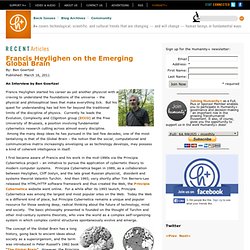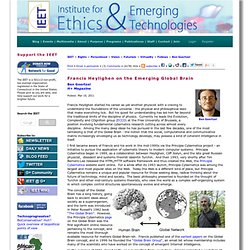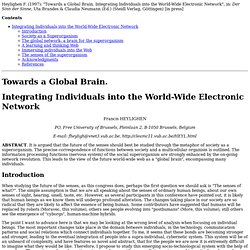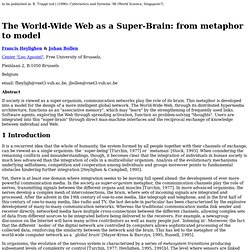

Francis Heylighen on the Emerging Global Brain. Ben Goertzel March 16, 2011 An Interview by Ben Goertzel Francis Heylighen started his career as yet another physicist with a craving to understand the foundations of the universe – the physical and philosophical laws that make everything tick.

But his quest for understanding has led him far beyond the traditional limits of the discipline of physics. Currently he leads the Evolution, Complexity and COgnition group (ECCO) at the Free University of Brussels, a position involving fundamental cybernetics research cutting across almost every discipline. I first became aware of Francis and his work in the mid-1990s via the Principia Cybernetica project – an initiative to pursue the application of cybernetic theory to modern computer systems. The concept of the Global Brain has a long history, going back to ancient ideas about society as a superorganism, and the term was introduced in Peter Russell’s 1982 book “The Global Brain”. Ben: The global brain means many things to many people. Francis Heylighen on the Emerging Global Brain. Francis Heylighen started his career as yet another physicist with a craving to understand the foundations of the universe - the physical and philosophical laws that make everything tick.

But his quest for understanding has led him far beyond the traditional limits of the discipline of physics. Currently he leads the Evolution, Complexity and COgnition group (ECCO) at the Free University of Brussels, a position involving fundamental cybernetics research cutting across almost every discipline. Among the many deep ideas he has pursued in the last few decades, one of the most tantalizing is that of the Global Brain - the notion that the social, computational and communicative matrix increasingly enveloping us as technology develops, may possess a kind of coherent intelligence in itself.
I first became aware of Francis and his work in the mid-1990s via the Principia Cybernetica project - an initiative to pursue the application of cybernetic theory to modern computer systems. Through the Wormhole: Global Network's Effects on Humans. GBconceptions. Conferència de Francis Heylighen. Francis Heylighen: Foundations for a Mathematical Model of the Global Brain. Global Brain: Web as Self-organizing Distributed Intelligence - Francis Heylighen. Francis Heylighen. Francis Paul Heylighen (born 1960) is a Belgian cyberneticist investigating the emergence and evolution of intelligent organization.
He presently works as a research professor at the Vrije Universiteit Brussel, the Dutch-speaking Free University of Brussels, where he directs the transdisciplinary research group on "Evolution, Complexity and Cognition"[1][2] and the Global Brain Institute. He is best known for his work on the Principia Cybernetica Project, his model of the Internet as a Global brain, and his contributions to the theories of memetics and self-organization. Biography[edit] Francis Heylighen was born on September 27, 1960 in Vilvoorde, Belgium. He received his high school education from the "Koninklijk Atheneum Pitzemburg" in Mechelen, in the section Latin-Mathematics. In 1983 he started working as a researcher for the Belgian National Fund for Scientific Research (NFWO).
Work[edit] His research focuses on the emergence and evolution of complex, intelligent organization. Francis Heylighen. Towards a Global Brain. Heylighen F. (1997): "Towards a Global Brain.

Integrating Individuals into the World-Wide Electronic Network", in: Der Sinn der Sinne, Uta Brandes & Claudia Neumann (Ed.) (Steidl Verlag, Göttingen) [in press] Contents Francis HEYLIGHEN PO, Free University of Brussels, Pleinlaan 2, B-1050 Brussels, Belgium E-mail: fheyligh@vnet3.vub.ac.be, ABSTRACT. Introduction When studying the future of the senses, as this congress does, perhaps the first question we should ask is "The senses of what? ". The point I want to advance here is that we may be looking at the wrong level of analysis when focusing on individual beings. Society as a Superorganism It is an old idea, dating back at least to the ancient Greeks, that human society is in a number of respects similar to a living system.
The fact that complex organisms, like our own bodies, are built up from individual, living cells, led to the concept of superorganism. Table 1: General systems functions in multicellular organisms and societies. To be published in: R.

Trappl (ed.) (1996): Cybernetics and Systems '96 (World Science, Singapore?) Francis Heylighen: home page. Francis Heylighen - Citations Google Scholar. Author:F-Heylighen.